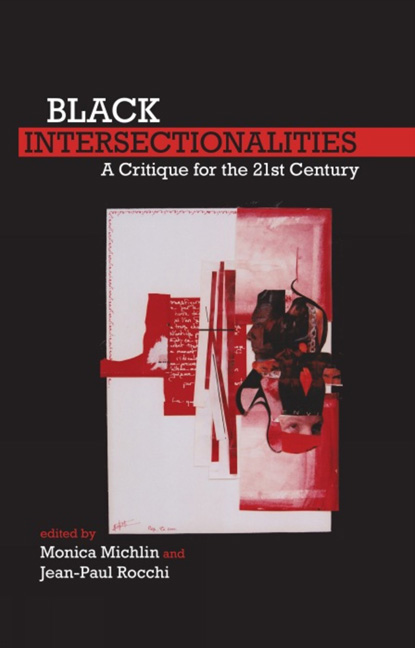Book contents
- Frontmatter
- Contents
- 1 Introduction: Theorizing for Change: Intersections, Transdisciplinarity, and Black Lived Experience
- 2 Exordium: Writing and the Relation: From Textual Coloniality to South African Black Consciousness
- I Challenging Hegemonic Gender Identities
- II Nonconformity and Narrative heorizing
- 6 Benjamin Franklin's Ethnic Drag – Notes on Abolition, Satire, and Affect
- 7 “Weh eye nuh see heart nuh leap”: Claude McKay's Literary Drag Performance in Banana Bottom
- 8 The Souls of Black Gay Folk: The Black Arts Movement and Melvin Dixon's Revision of Du Boisian Double Consciousness in Vanishing Rooms
- III Upsurges of Desire
- IV Epistemological Genealogies and Prospections
- Contributors
- Index
8 - The Souls of Black Gay Folk: The Black Arts Movement and Melvin Dixon's Revision of Du Boisian Double Consciousness in Vanishing Rooms
from II - Nonconformity and Narrative heorizing
- Frontmatter
- Contents
- 1 Introduction: Theorizing for Change: Intersections, Transdisciplinarity, and Black Lived Experience
- 2 Exordium: Writing and the Relation: From Textual Coloniality to South African Black Consciousness
- I Challenging Hegemonic Gender Identities
- II Nonconformity and Narrative heorizing
- 6 Benjamin Franklin's Ethnic Drag – Notes on Abolition, Satire, and Affect
- 7 “Weh eye nuh see heart nuh leap”: Claude McKay's Literary Drag Performance in Banana Bottom
- 8 The Souls of Black Gay Folk: The Black Arts Movement and Melvin Dixon's Revision of Du Boisian Double Consciousness in Vanishing Rooms
- III Upsurges of Desire
- IV Epistemological Genealogies and Prospections
- Contributors
- Index
Summary
This chapter explores the influence and impact of the Black Arts Movement on the Black Gay Generation of 1986. The year 1986 refers to the publication of Joseph Beam's pioneering In the Life: A Black Gay Anthology, the first collective expression of African American gay identity. That anthology was followed five years later by a sequel, Brother to Brother: New Writings by Black Gay Men, co-edited by Beam and Essex Hemphill. Together the two anthologies defined a generation of black gay writing. Some of the notable writers and culture workers in the two anthologies, in addition to Beam and Hemphill, were Assotto Saint, Reginald Shepherd, Craig G. Harris, Samuel R. Delany, Marlon Riggs, Isaac Julien, and Kobena Mercer. Although the anthologies were published by a small independent gay press, their wide readership and incorporation into the cultural landscape signaled the emergence of a movement of black queer artists in the American (and European) mainstream. The choreographers David Rousseve and Bill T. Jones, the artist Glenn Ligon, the performance group Pomo Afro Homos, and the bestselling E. Lynn Harris, whose first, self-published, novel, Invisible Life, was about urban black men negotiating their queer sexual and racial identities, also arrived on the American cultural landscape in 1991, although they did not appear in either of the two anthologies. Many contributors to the anthologies were casualties of the first decade of the AIDS pandemic. Melvin Dixon, the subject of this chapter, was one of those casualties, passing away in October 1992. His work as a writer reflects how the intersection of two emblematic movements of the 1970s – Black Arts and Gay Liberation – influenced a collective black gay identity.
Dixon's early death – he was only forty-two years old – was a tragic loss for the gay and African American literary worlds. In their introduction to an edition of Dixon's scholarly essays, critics Dwight McBride and Justin Joyce correctly assess that Dixon was “our generation's black gay literary treasure, cut off too soon” (Joyce and McBride, 2006: ix). In his all too brief life, Dixon earned a doctorate, became a full professor, published two novels, three volumes of poetry, a volume of literary criticism, and translated two volumes from French into English, one of which was the collected poems of Senegalese writer and politician Leopold Sedar Senghor.
- Type
- Chapter
- Information
- Black IntersectionalitiesA Critique for the 21st Century, pp. 114 - 126Publisher: Liverpool University PressPrint publication year: 2013



